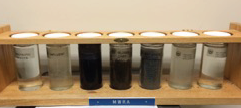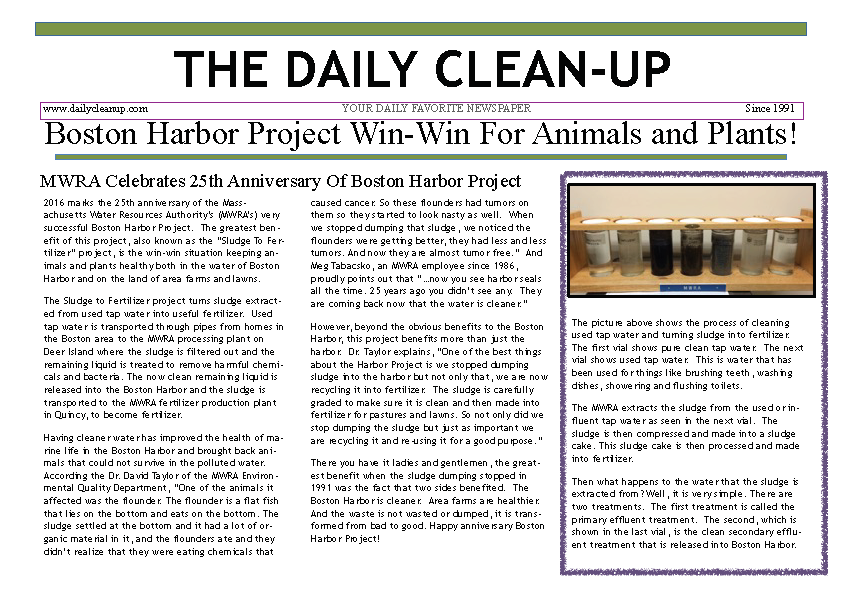Boston Harbor Project Win-Win For Animals and Plants!
MWRA Celebrates 25th Anniversary Of Boston Harbor Project
2016 marks the 25th anniversary of the Massachusetts Water Resources Authority’s (MWRA’s) very successful Boston Harbor Project. The greatest benefit of this project, also known as the “Sludge To Fertilizer” project, is the win-win situation keeping animals and plants healthy both in the water of Boston Harbor and on the land of area farms and lawns. The Sludge to Fertilizer project turns sludge extracted from used tap water into useful fertilizer. Used tap water is transported through pipes from homes in the Boston area to the MWRA processing plant on Deer Island where the sludge is filtered out and the remaining liquid is treated to remove harmful chemicals and bacteria. The now clean remaining liquid is released into the Boston Harbor and the sludge is transported to the MWRA fertilizer production plant in Quincy, to become fertilizer.
Having cleaner water has improved the health of marine life in the Boston Harbor and brought back animals that could not survive in the polluted water. According the Dr. David Taylor of the MWRA Environmental Quality Department, “One of the animals it affected was the flounder. The flounder is a flat fish that lies on the bottom and eats on the bottom. The sludge settled at the bottom and it had a lot of organic material in it, and the flounders ate and they didn’t realize that they were eating chemicals that caused cancer. So these flounders had tumors on them so they started to look nasty as well. When we stopped dumping that sludge, we noticed the flounders were getting better, they had less and less tumors. And now they are almost tumor free.”
And Meg Tabacsko, an MWRA employee since 1986, proudly points out that “…now you see harbor seals all the time. 25 years ago you didn’t see any. They are coming back now that the water is cleaner.”
However, beyond the obvious benefits to the Boston Harbor, this project benefits more than just the harbor. Dr. Taylor explains, “One of the best things about the Harbor Project is we stopped dumping sludge into the harbor but not only that, we are now recycling it into fertilizer. The sludge is carefully graded to make sure it is clean and then made into fertilizer for pastures and lawns. So not only did we stop dumping the sludge but just as important we are recycling it and re-using it for a good purpose.”
There you have it ladies and gentlemen, the greatest benefit when the sludge dumping stopped in
1991 was the fact that two sides benefited. The Boston Harbor is cleaner. Area farms are healthier. And the waste is not wasted or dumped, it is transformed from bad to good. Happy anniversary Boston Harbor Project!

The picture above shows the process of cleaning used tap water and turning sludge into fertilizer. The first vial shows pure clean tap water. The next vial shows used tap water. This is water that has been used for things like brushing teeth, washing dishes, showering and flushing toilets. The MWRA extracts the sludge from the used or influent tap water as seen in the next vial. The sludge is then ompressed and made into a sludgecake. This sludge cake is then processed and made into fertilizer. Then what happens to the water that the sludge is extracted from? Well, it is very simple. There are two treatments. The first treatment is called the primary effluent treatment. The second, which is shown in the last vial, is the clean secondary effluent treatment that is released into Boston Harbor.
